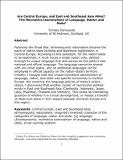Are Central Europe, and East and Southeast Asia alike? The normative isomorphism of language, nation and state
Abstract
Following the Great War, ethnolinguistic nationalism became the basis of nation-state building and statehood legitimation in Central Europe. According to this paradigm, for the nation-state to be legitimate, it must house a single nation only, defined through its unique language that also serves as this polity’s sole national and official language. The language cannot be shared with any other states, and no additional languages can be employed in official capacity on the nation-state’s territory. Initially, I thought that this unique normative isomorphism of language, nation, and state was specific exclusively to Central Europe. But scanning the language policies of today’s extant states, I discovered that another cluster of ‘isomorphic polities’ exists in East and Southeast Asia (Cambodia, Indonesia, Japan, Laos, Myanmar, Thailand and Vietnam). This raises an interesting question of whether it is a local development, or maybe a transfer of ideas took place in this respect between (Central) Europe and this region.
Citation
Kamusella , T D 2016 , Are Central Europe, and East and Southeast Asia alike? The normative isomorphism of language, nation and state . in K Hara & P Heinrich (eds) , Standard Norms in Written Languages : Historical and Comparative Studies Between East and West . Joshibi University of Art and Design , Tokyo , pp. 13-78 .
Publication
Standard Norms in Written Languages
Type
Book item
Collections
Items in the St Andrews Research Repository are protected by copyright, with all rights reserved, unless otherwise indicated.

